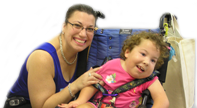What Would "Better" Diagnosis of ASDs Look Like?: DSM-5 and Beyond
| Download |
|
|
| Archived Recording |
In order to view the webinar presentation, please click on the webinar icon below.
|
4:00pm Eastern - 5:00PM Eastern
Location: Online

View Archived Recording Now in our WEBINAR LIBRARY
About the Webinar
Because there is not yet a biological test that indicates autism, these diagnoses must be based on the observations of clinicians and the reports of caregivers and teachers. Due to the variability in ASDs, inexperienced or ill-informed clinicians can make incorrect diagnoses, which can cause hardship for families and significant cost to children and adults with and without ASD. In addition, research to determine causes and effective treatments for ASD is dependent on being able to compare groups of children or adults with ASD across different studies. If participants are chosen whose diagnoses are based on different information, results may be impossible to interpret. This presentation will address how research in ASD has attempted to address these issues by moving in several different directions, using the newly-proposed DSM-5 criteria as a framework
Speaker
Dr. Catherine Lord is a clinical psychologist who has worked in Canada and the U.K and at various universities in the U.S., including the TEACCH program. She was involved in developing standardized diagnostic instruments for ASD [the Autism Diagnostic Observation Schedule (ADOS), an observational scale, and the Autism Diagnostic Interview - Revised (ADI-R), a parent interview], considered the gold standard for research diagnoses. She was the Chair of the Committee on Effectiveness of Early Intervention in Autism for the National Research Council.
For more information about this event contact Jennifer Bogin, Program Manager, AUCD







